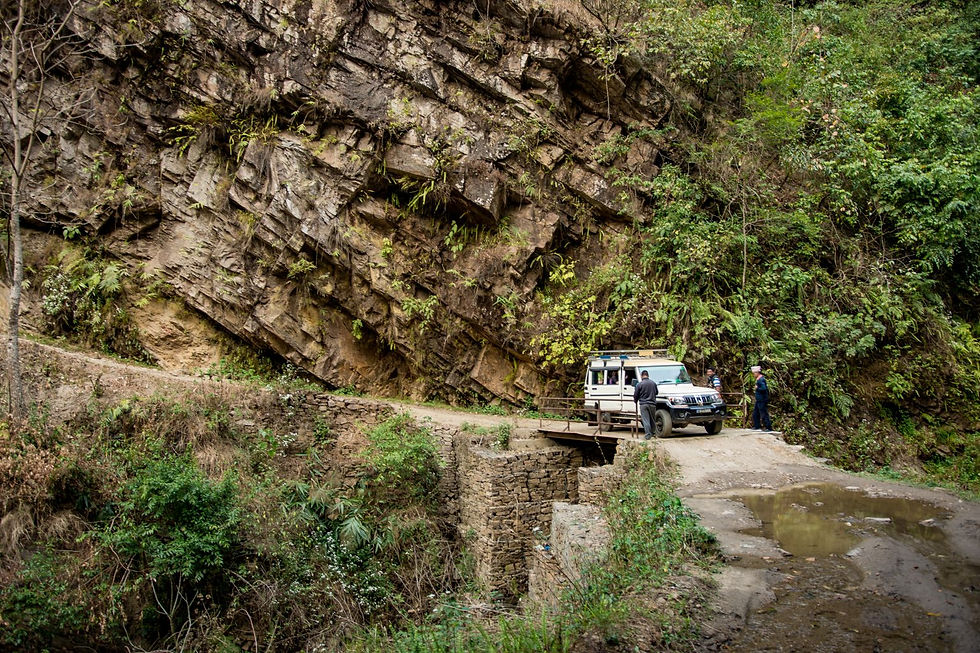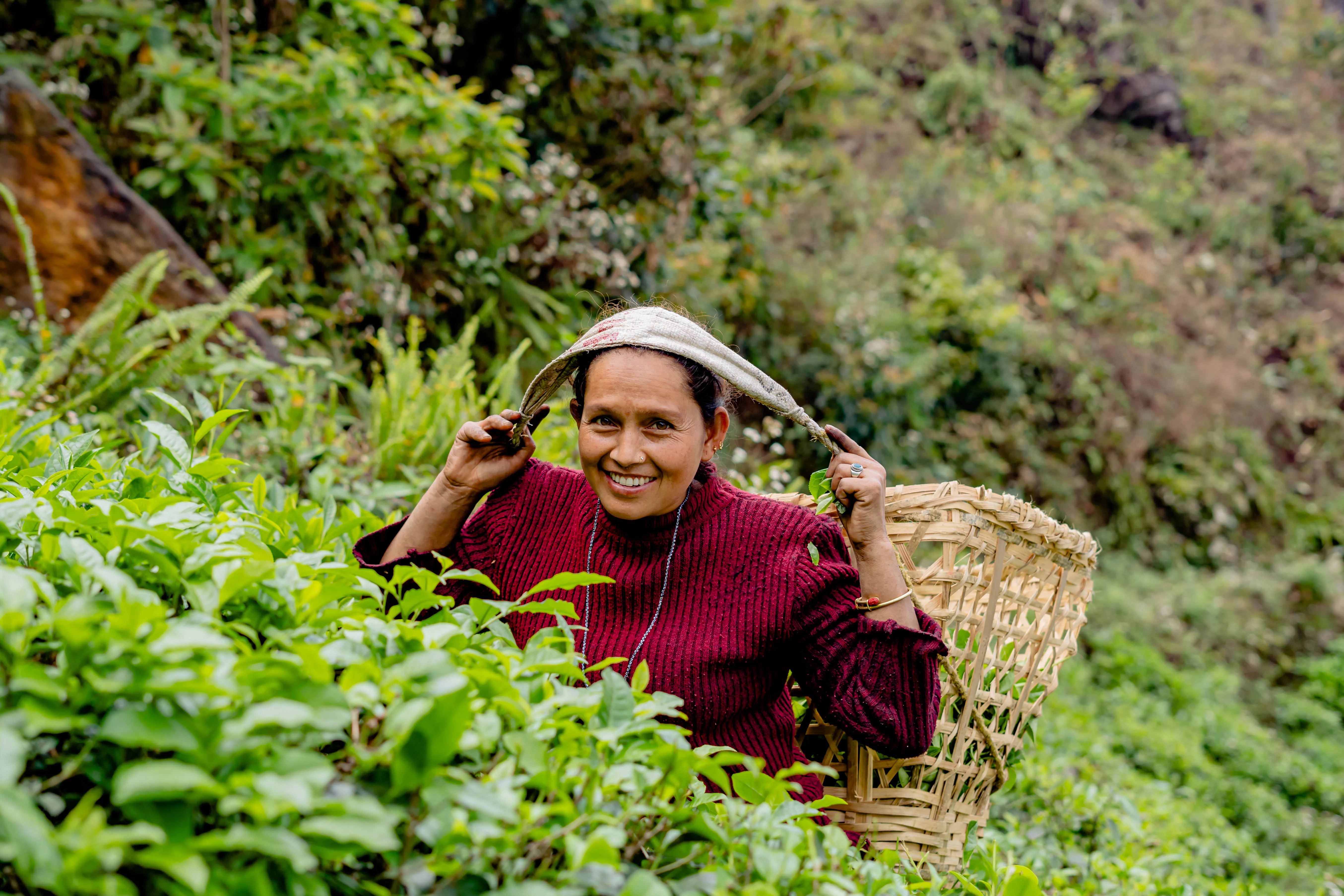From Nepal to the World: Nishchal Banskota on Elevating Nepali Tea
- Lorela Lohan

- Aug 9, 2024
- 8 min read
Updated: Aug 26, 2025
Interview with Nishchal Banskota, Founder of Nepal Tea Collective
Introduction:
In this interview with Nishchal Banskota, founder of Nepal Tea Collective, we dig into the journey of building a socially responsible tea brand that empowers Nepali farmers through sustainability and direct trade. We discuss how Nishchal’s experiences in the U.S. shaped his mission, the challenges of changing tea perceptions in Nepal, and the innovative approaches to tea blending and ethical sourcing.
This conversation also marks the start of an exciting collaboration, as I join Nepal Tea Collective as a brand ambassador, working to introduce Nepali teas to the European market. Together, we aim to share the rich heritage and unique flavors of Nepali tea with a broader audience.
About Nepal Tea Collective
Nepal Tea Collective is more than just a tea brand; it is a social enterprise committed to transforming the lives of farmers through direct trade, sustainability, and ethical sourcing. Founded on the principles of transparency and community empowerment, the Collective connects tea lovers worldwide with the rich flavors and stories of Nepali tea. In 2023, Nepal Tea Collective's initiatives have led to the establishment of education programs for farmers' children, the implementation of sustainable farming practices, and the distribution of 1% of their top-line revenue back to the farmers. These efforts reflect their unwavering commitment to not only delivering high-quality, organic teas but also ensuring that the communities behind these teas thrive.
Lorela: Nishchal, it's a pleasure to speak with you today. To start off, could you share some insights into how your experiences abroad, particularly in the U.S., influenced the mission and vision of Nepal Tea Collective?
Nishchal: Thank you, Lorela. My time in the U.S. had a profound impact on me, both personally and professionally. Initially, I went to the U.S. to study finance and accounting with the goal of pursuing a career on Wall Street. However, my exposure to liberal arts education and the opportunities to engage in social impact projects, like building classrooms for underprivileged children in Nepal with some American students, significantly shifted my perspective. I realized that true happiness for me came from doing something meaningful for others. This realization, combined with my experiences during the 2015 earthquake in Nepal, inspired me to return home and focus on creating something that could make a real difference. That’s how Nepal Tea Collective was born, with a mission to elevate Nepali tea and support the farmers who cultivate it.

The Growing Team of Nepal Tea Collective
Lorela: It's fascinating how your journey led you back to tea, especially considering your family’s history with it. Can you tell us more about the challenges you faced in changing the perception of tea in Nepal?
Nishchal: Absolutely. When I returned to Nepal, I noticed that tea was often seen as an inferior beverage compared to coffee. People were willing to pay a premium for coffee but not for tea, which was seen as something cheap and everyday. I wanted to change that perception, so I started a Tea Bar in Nepal, inspired by tea bars I had seen like DavidsTea. The idea was to create a space where people could enjoy high-quality tea in a refined setting, similar to a café experience. However, I made some mistakes initially—like not offering milk and sugar, which alienated many potential local customers who were accustomed to traditional milk tea or not considering the importance to be on site to outreach and networking. It was a learning experience, and it taught me the importance of understanding local tastes and culture. What surprised me the most, and this might be connected also to other tea regions, is the inequality in revenue distribution to the farmers—those who actually put in all the hard work.
Lorela: Speaking of understanding local culture and tea production, your brand is heavily focused on sustainability and ethical sourcing. What were some of the first steps you took to ensure that the tea production was both environmentally sustainable and socially responsible?
Nishchal: Sustainability is at the heart of what we do, and we approach it from three angles: environmental, social, and economic. Environmentally, we’ve helped our farmers transition to organic practices, providing them with training and support to get certified. We also encourage regenerative agriculture by promoting the planting of complementary crops like lemongrass and cinnamon, which not only benefit the soil but also provide additional income for the farmers year-round. Socially, we’ve invested in education for the children of our full-time farmers and established an emergency fund to support them in times of crisis. Economically, we’ve implemented a 1% top-line revenue distribution model, ensuring that farmers are not just suppliers but partners in our success.
Lorela: That’s incredible work, especially in blending social impact with business. On that note, tea blending is becoming increasingly popular globally. How does Nepal Tea Collective approach blending, and what are your thoughts on the future of blends?
Nishchal: Blending is definitely an area of growth, and it’s something we approach with both caution and creativity. While we respect the purity of traditional teas, we recognize that blending can introduce people to tea who might not otherwise be interested. It’s also a way to diversify our product offerings and meet consumer demand for functional beverages. For example, we’ve started incorporating herbs like ginger and turmeric, which not only have health benefits but also provide farmers with year-round income since these crops grow during tea’s dormant season. We’re still in the early stages of developing our blending strategy, but we’re excited about the possibilities.
Don't hesitate to try out the
BLACK TEA BLEND's mix of healthy spices
Ingredients: Organic golden tips black tea, SFTGF OP black tea, ginger, black cardamom, lemongrass, cinnamon leaves and orange peel
Flavor notes: Fruity | Warm Spices | Citrus
Low caffeine content
Health Benefits: Supports digestion
Lorela: Nepal’s unique geography undoubtedly contributes to the distinctive flavors of your teas. Could you elaborate on how the terroir in Nepal influences the taste of your teas?
Nishchal: Nepal’s terroir is truly unique, and it plays a significant role in shaping the flavor profiles of our teas. Our tea-growing regions, like Ilam and Panchthar, have a microclimate that’s somewhat similar to Darjeeling but with its own distinct characteristics. The high elevation, acidic soil, and cool mountain air contribute to the slow growth of tea leaves, resulting in a richer, more complex flavor. Additionally, our tea bushes are relatively young, which gives the teas a fresh, vibrant quality. Our tea makers, who are more like artists than traditional craftsmen, also experiment with different techniques, further enhancing the uniqueness of Nepali tea.

Lorela: You mentioned the importance of the farmers in your supply chain. What steps are you taking to ensure that they receive their fair share, and what are your future plans in this area?
Nishchal: Ensuring that farmers are fairly compensated is a priority for us. We’ve already implemented the 1% revenue share model, and we’re committed to increasing that over time. We’re also working on giving more recognition to the tea makers themselves. Our next packaging update will feature the faces and stories of the farmers who produce the tea, helping to build a direct connection between them and the consumers. In the long term, we want to make tea plucking and production more attractive to the younger generation by improving wages and providing opportunities for advancement. We believe that by taking this approach, we can ensure the sustainability of the tea industry in Nepal. As the current generation of tea producers ages and younger generations gravitate towards less labor-intensive activities, our goal is to make tea production appealing once more, elevating its perception and attracting new talent to the craft.

Tea producers: Nikesh Gurung (on the left) and Chandra Prakash Bhattarai (on the right).
Lorela: Storytelling is clearly a big part of your brand. How do you see this evolving, and what role does it play in connecting with consumers?
Nishchal: Storytelling is essential, especially in markets like the U.S. and Europe, where consumers want to know the story behind the products they buy. We’re focusing on making these stories as accessible as possible, whether through our packaging, our website, or even QR codes that allow consumers to tip the farmers directly. The next step is to bring these stories to life in more interactive ways, perhaps through virtual tea farm tours or live sessions with the farmers. We believe that by deepening this connection, we can build a more loyal and informed customer base.
Lorela: You’ve successfully entered the U.S. market. What were some of the challenges you faced during this expansion, and how did you overcome them?
Nishchal: Entering the U.S. market was challenging, primarily because Nepali tea isn’t as well-known as teas from other regions. We had to work hard to educate consumers about the unique qualities of our teas and justify the prices we were asking for them. Additionally, there was the challenge of simply getting people to know where Nepal is and what it stands for in the tea world. We tackled this through a combination of storytelling, tea travel, high-quality products, and strategic partnerships with retailers and online platforms that share our values. It’s been a learning process, but we’ve made significant progress and are optimistic about the future.
Lorela: Finally, what are your long-term goals for Nepal Tea Collective, and how do you envision the future of Nepali tea on the global stage?
Nishchal: Our long-term goal is to establish Nepali tea as a respected and recognized name globally, much like Darjeeling or Assam. We want to continue expanding our reach while maintaining our commitment to quality and sustainability. We also aim to empower more farmers, particularly women, to take on leadership roles in tea production. Ultimately, we see Nepal Tea Collective not just as a business, but as a movement that brings positive change to the tea industry and the communities that depend on it.

Lorela:Thank you so much for your time, Nishchal. It’s been a pleasure learning about your journey and the inspiring work you’re doing with Nepal Tea Collective.
Nishchal: Thank you, Lorela. It’s been great sharing our story with you.
Some words on our collaboration
Nischal: Founder of Nepal Tea Collective
Over the past 8 years, we've really done what we can to create an identity for Nepali Teas in the North American market, and now it's time to take it one step further by tapping into the European Market. There could be no one better than Lorela, an entrepreneur herself, to be representing us and the Nepali Tea industry in this arena. We're super grateful to have her as our ambassador and can't wait to bring more tea lovers around Europe the real taste of amazing Nepali teas! See you all in Europe soon!
Lorela: Founder of WanderslusTea
I am truly honored and excited to join Nepal Tea Collective in this next chapter as we expand into the European market. Nishchal and his team have done an incredible job of establishing a strong identity for Nepali teas in North America, and I’m thrilled to help bring that same passion and authenticity to tea lovers across Europe.
As a brand ambassador for Nepal Tea Collective, I am committed to sharing the rich flavors, deep heritage, and values of sustainability and community empowerment that define this remarkable brand. It’s a privilege to represent such a meaningful movement, and I’m confident that together, we can elevate the presence of Nepali tea on the global stage. Thank you to Nishchal and the entire Nepal Tea Collective team for this opportunity—I look forward to an exciting journey ahead!
For more information, about Nepal Tea Collective, you can check their website and the interview, Katrina Wild did for Tea Master Talks: Himalayan Treasures: Tea from Nepal
Photos credit: Kajina Shrestha and Nepal Tea Collective Website













Comments